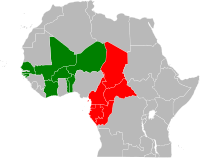Central banks and currencies of Africa

Okay, let's say you have a piggy bank where you keep all of your money. You can put in coins or paper bills, and you can take them out whenever you need something. That's kind of like what a central bank does for a whole country.
In Africa, there are many different countries that have their own money, like Nigeria with the Naira or South Africa with the Rand. But the central banks of those countries also have an important role in managing the money.
One job of the central banks is to make sure that there is enough money in circulation for people to use, without too much inflation or too little money. It's kind of like how you need to decide how much allowance to give yourself each week so you don't run out too fast or overspend too much.
Another important job of central banks is to help keep the exchange rate stable. The exchange rate is how much one country's money is worth compared to another country's money. This is important for trade and business, and for people who want to travel to different countries. So the central banks may sometimes buy or sell their own currency to make sure the exchange rate stays steady.
Finally, central banks might also try to influence the economy by changing interest rates. If they want people to spend more money and help the economy grow, they might lower the interest rates so it's cheaper to borrow money. If they want to prevent inflation or slow down spending, they might raise interest rates.
So although there are many different currencies in Africa, the central banks play an important role in managing them and keeping the economy stable.
In Africa, there are many different countries that have their own money, like Nigeria with the Naira or South Africa with the Rand. But the central banks of those countries also have an important role in managing the money.
One job of the central banks is to make sure that there is enough money in circulation for people to use, without too much inflation or too little money. It's kind of like how you need to decide how much allowance to give yourself each week so you don't run out too fast or overspend too much.
Another important job of central banks is to help keep the exchange rate stable. The exchange rate is how much one country's money is worth compared to another country's money. This is important for trade and business, and for people who want to travel to different countries. So the central banks may sometimes buy or sell their own currency to make sure the exchange rate stays steady.
Finally, central banks might also try to influence the economy by changing interest rates. If they want people to spend more money and help the economy grow, they might lower the interest rates so it's cheaper to borrow money. If they want to prevent inflation or slow down spending, they might raise interest rates.
So although there are many different currencies in Africa, the central banks play an important role in managing them and keeping the economy stable.
Related topics others have asked about:
